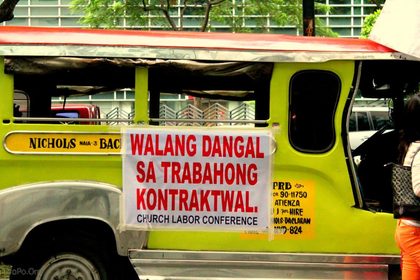SUMMARY
This is AI generated summarization, which may have errors. For context, always refer to the full article.

MANILA, Philippines – Not only did the global economic crisis put more people out of jobs, it also harmed workers already employed as countries around the world modifed laws on employee protection.
In its 2012 “World of Work” report released on the eve of Labor Day celebrations worldwide, the International Labor Organization (ILO) said that 40 out of 131 countries surveyed changed their laws for permanent employees.
At least 60% of the changes reduced employment protection through the following:
- increasing probationary periods
- expanding the grounds for justified dismissal
- reducing severance payments and notice periods
- weakening the remedies in the case of unfair dismissal
This trend is most evident in 13 countries with advanced economies. A total of 15 countries, on the other hand, changed legislation on collective dismissals for economic reasons by doing away with some requirements or relaxing regulation on it, such as those in central and southeastern Europe.
The ILO is discouraging the creation of jobs that offer the least protection for workers. Countries should not make it a choice — less or more regulation for employee protection — but instead focus on how regulations that protect workers are designed, according to the ILO.
The ILO warned that the “weakening of regulations and institutions may leave the labor market with no protection floor or a very low one – thereby hampering overall job recovery prospects.”
‘Precarious employment’
The dominant form of employment also changed within the period of the global crisis, from March 2008 to 2012.
“Precarious employment” – called as such because of unsafe working conditions, lack of security and poor compensation – has increased. Precarious employment includes part-time and temporary jobs.
Part-time employment has risen in two-thirds of the advanced countries surveyed, while temporary employment increased in one-half of these countries.


Part-time employment in Greece, Italy and Spain rose by almost 50% in 2010. Temporary employment also increased by as much as 80% in Greece, Portugal and Spain – countries that bore the brunt of the economic crunch in Europe. It decreased though in Austria, Belgium and Germany.
Wages for temporary employment or fixed-term contracts are lower compared to those provided in permanent employment.
In 9 countries with different economic conditions, the ILO noted that wages for temporary jobs are 40% lower than those with permanent work.
The ILO said that income inequality will make it more difficult for employees to access health services, food and credit for starting small and medium businesses. – Rappler.com
Add a comment
How does this make you feel?
There are no comments yet. Add your comment to start the conversation.